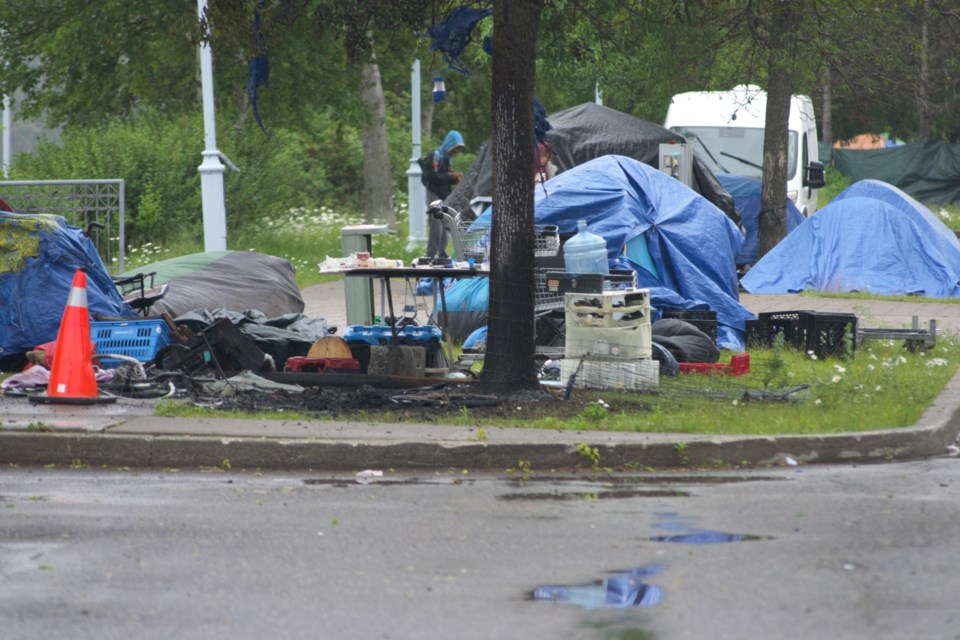THUNDER BAY – City Administration is proposing a $4 million dollar project to build 100 temporary shelters with prefabricated insulation, lockable doors, heating, electricity, a fixed address for case management purposes, and 24/7 support services.
It's one piece of a ten-part Human Rights-Based Community Action Plan for addressing homelessness and managing encampments in the city, administration presented during Monday’s Oct. 7 council meeting.
There was no vote this week; the plan is still at the first draft stage. It sets out long-term strategies to reduce the number of unhoused individuals through collaboration with community partners, enhanced sanitation, designated encampment sites, and the city-sanctioned temporary villages with at-the-ready support services.
The price tag made the temporary village proposal contentious.
Administration estimated a $4 million cost to build a temporary village, with operational costs to come forward at the next council meeting.
“This is not another encampment. It is a structured community designed to provide stable dignified temporary shelter,” said Cynthia Olsen, Director of Strategy & Engagement.
City manager John Collin said the plan would be to apply pressure on upper levels of government to support the human rights-based plan.
“We have no intention that the municipality looks for $4 million. None whatsoever. What you find in the report is a request and recommendation that we front the money through the reserves and go after the other order of government for reimbursement,” Collin said.
Councillor Shelby Ch'ng explained that through all the discussions around the council about the cost of building the temporary shelters, she “believes it’s a myth that (the city) can’t afford it because we are paying for things right now.”
Councillor Rajni Agarwal said that “it’s unfortunate there are people that are suffering,” but she would like to see a more permanent solution be looked into by administration.
Collin said the administration had looked at all options and their action plan had the best chance of success.
“We have explored all the options including trying to accelerate either TBDSSAB's work or our own work for permanent housing. This is still many years away before we will have sufficient housing, and in some cases supportive housing, or transitional housing that is required. This is still many years away,” said Collin.
“The solution is housing for all. This isn’t housing. This is a temporary shelter. TBDSSAB, provincial government, and federal government, that is their role to ultimately resolve. We are stressing that this is temporary because we are not in the housing game in this way and we do not wish this village to exist in perpetuity,” Collin said.
Although housing support and social assistance are the jurisdictional work of the federal and provincial governments, Collin told council that those levels of government have not provided the necessary “resources or plans to achieve the much-needed housing for all.”
“The people of our city do not care who is responsible. They simply want the challenges solved and the most disadvantaged cared for. For those suffering, the priority is not about jurisdiction at all. It's about survival and dignity,” Collin said.
A specific location for the temporary village was not discussed as administration still consider the best place; however, Olsen noted that the chosen location will follow the new distances guidelines council ratification in July.
According to administration, the city reached a peak of 200 unhoused people living in encampments this year. Looking at this trend, administration said the city could see a rise in encampments in the summer of 2025, “unless immediate and innovative actions are taken.”
Administration hopes to implement the ten-part plan by next summer.
“The question is whether or not this council is supportive of dealing with the needs of the homeless now and the corresponding impact on the community by not having effectively dealt with the homeless challenge until now,” said Colllin.
If it's approved, approximately $450,000 will be used to support specially trained outreach workers and related health and safety response measures such as garbage collection and sanitation of onsite washroom facilities.
Specialized outreach workers will also consist of various community partners; however, they weren’t named in the report or during the council discussion.
Outside partners would aid in the wrap-around support from multi-agency organizations such as municipal departments, community partners, and volunteers to provide healthcare, food, transitional housing, and employment services.
Mayor Ken Boshcoff said that he was in full support of the plan because “something has to be done” despite the "price tag.”
This story has been updated with new information.
